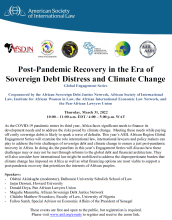Global Engagement Series Webinar: Post-Pandemic Recovery in the Era of Sovereign Debt Distress and Climate Change
The American Society of International Law (ASIL) initiated a Global Engagement Series in collaboration with our regional Colleague Societies. The series comprise four virtual events held as “previews” in the weeks preceding ASIL’s Annual Meeting. AfSDJN is the lead coordinator of this years Global Engagement Series for the African Region.The preview sessions will be available worldwide, free of charge.
